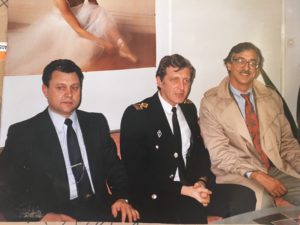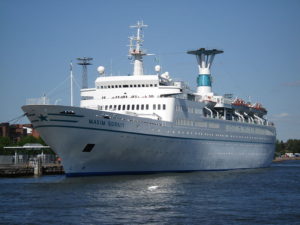Cold War

Perhaps the most significant feature of international relations that shaped how baby boomers viewed their place in the world was the Cold War between the US and the USSR. This conflict between nuclear armed behemoths was an existential threat and the principal organizing principle for most of the world’s countries and people from the end of the Second World War until 1991. I’m sure we each have memories of feeling personally at risk during this high-wire act of international diplommacy.
Cuban Missile Crisis
One of my first clear memories of the ominous cloud of the Cold War was the October, 1962 Cuban Missile Crisis . I was just a month into my sophomore year in high school when President John F. Kennedy and Soviet Premier Nikita Kruschev came within hours of lobbing nuclear-tipped missiles at each other. My 15 year-old friends and I walked to school those tense mornings without having bothered to complete our homework because of a tangible fear that we might all be blown to smithereens before we’d have to deal with the failing grades.
The Beginning of the End of the Cold War
Well, the world didn’t end those days in 1962 (I don’t remember how I finagled the incomplete homework). In fact, we obviously made it through to the end of the Cold War almost 30 years later without blowing each other up. The official end came on Christmas Day, 1991, when Soviet Communist leader Mikhail Gorbachev signed the documents officially ending the exstence of the USSR. [Few know that Gorbachev’s pen didn’t work that day, and he had to borrow a Mont Blanc pen from my boss, CNN President Tom Johnson, who was in the room preparing for a televised interview with Gorbachev.]
But this dark and risky global conflict between communism and capitalism was clearly ending years before that fateful Christmas day in 1991. 1989 was a pivotal year when commentators worldwide began to sense the end was near. Gorbachev had, in retrospect, opened the floodgates that resulted in the torrent that brought the USSR down from the inside years ealier with the introduction of Perestroika (reform) and Glasnost (openness) to the ossified communist system. By November of 1989, the iconic Berlin Wall, preventing Germans in the communist East from travelling to the democratic West, was breached for good by pick-ax wielding civilians on both sides. [I still hold on to some pieces of that wall as mementos of those turbulent and exciting times.]
The Malta Summit Between Bush (the Senior) and Gorbachev
In early December 1989 I was part of a large CNN contingent on the stormy island of Malta off the coast of Italy. We were there to cover a summit meeting between US President George HW Bush and Soviet leader Gorbachev. While no major agreements were signed, the meeting of the two leaders has been widely hailed as marking the de facto end of the Cold War. Essentially, President Bush wanted to assure Gorbachev that the US would not seek to take undue advantage of the social upheaval that had been unleashed throughout the Soviet sphere of influence by Gorbachev’s heroic efforts to democratize the communist bloc. He could continue his important reform efforts without having to worry about the US seeking its own gain. Can you imagine such a spirt of cooperation prevailing in international politics today?

While fighting the hurricane-like winds on Malta, my job as head of CNN Public Relations was to corral a group of British engineers to make the CNN satellite signal available at principal locations at the summit–President Bush’s stateroom on the WW II vintage destroyer, USS Belknap, and the international press center in the town of Marsaxlokk. Although CNN’s signal was being distributed around the world at that time, it was pretty much restricted to a few hotels and government offices. To get the signal to Bush on the Belknap and to the world press center, we needed to install a large satellite dish on the roof of a restaurant in Malta to downlink the signal from space, then re-distribute it by microwave transmission to the two locations.
When the Soviets discovered we were going to give President Bush access to the real-time CNN news feed so he could immediately assess press coverage and world reaction, they asked if we could also deliver the signal to President Gorbachev’s quarters on board the cruise ship Maxim Gorky so that the Soviet leader could be on equal footing with Bush.

“Sure,” the bosses at CNN said. It fell upon me to make it happen. So we loaded a couple of vanloads of gear to the pier where the Maxim Gorky was moored. There we waited in the wind and rain until near dusk when Mikhail and his wife Raisa came home from a shopping spree and were safely onboard. We spent the next few hours installing a microwave receiver, braving the storm and the dark on the top deck, then stringing cable down the hallways of the ship to a single television in a reception room. I was surveying the cable-laying at one point (it was now well past midnight after a typical 20-hour workday) when, much to my surprise, around the corner strolls a bath-robed President Gorbachev. Alone. No KGB. Just him and me.
“Dobryy vecher” (good evening) I think I stammered. “I’m with CNN.”
“Da CNN,” he said and smiled. “Ochen’ khorosho” (very good). And we each departed, going our separate ways.

That may have been about as close as I ever came to being at the center of world politics, but this baby boomer remembers it to this day. In 2 years, Gorbachev was ousted as the Soviet Union ceased to exist, and in 3 years HW Bush was defeated by Bill Clinton. Neither man got the credit they deserved for peacefully ending the most dangerous period in world history. [I recommend Werner Herzog’s revealing documentary, Meeting Gorbachev.]

A great story!
Thanks for this account, Steve.
It’s fascinating how humans learn to ignore chronic existential risk. Like the millions of us who live on tectonic faultlines that are guaranteed to rupture, we rarely consider the threat of nuclear war these days — even though it is the largest risk Humanity faces. The Doomsday Clock https://thebulletin.org/doomsday-clock/ is closer to midnight than it has ever been, and people who study the various nuclear scenarios that could end us are deeply concerned. See former Secretary of Defense William Perry at https://www.wjperryproject.org/
Have a nice day!
You wisely remind us (me) not to be fooled by the trappings. The “Cold War” between two hostile ideological poles led by the US and USSR may have dramatically changed with the collapse of the USSR. But the world is still under dire threat from the same arsenal in the hands of even more threatening tribalistic foes.